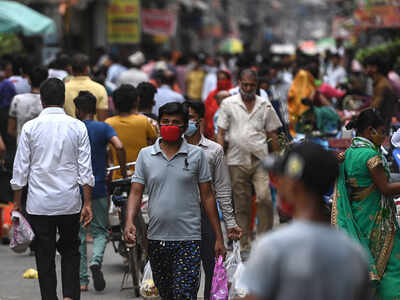Top Searches
- News
- India News
- AIIMS doctor lists two key factors behind Covid wave
AIIMS doctor lists two key factors behind Covid wave

NEW DELHI: The mutation of virus and human behaviour are the two key factors which can trigger a Covid wave, a top doctor at AIIMS has told news agency ANI.
"In any pandemic, the wave depends on two important factors: One is virus related and second is human-related factors," said Dr Neeraj Nischal, assistant professor (Department of Medicine), AIIMS.
He said that since mutation of the virus is something that cannot be controlled, people should adhere to Covid-appropriate behaviour to avoid another surge in cases.
The statement comes in the backdrop of several states lifting restrictions due to a consistent decline in fresh virus cases. However, visuals of people thronging markets and flouting Covid norms have forced experts to issue warnings about an early third wave of the pandemic.
AIIMS chief Dr Randeep Guleria on Saturday said that the third wave may hit India in the next six to eight weeks if people do not stick to Covid-appropriate behaviour.
Dr Nischal said that despite mutations, the subsequent waves of the virus can be prevented if people continue to follow the basic rules.
"Now virus mutates and becomes more infectious. It is something which is beyond our control. But of course, if we do not allow this virus to replicate in our body then maybe this type of mutations can be avoided. What we can do to control is our behaviour. We have been talking about COVID appropriate behaviour for 15-16 months and we know that by Covid-appropriate behaviour, one can stop these waves altogether. That had happened in the second wave also," he told ANI.
Several experts have warned against a third Covid wave in India, with some even suggesting that it is inevitable.
According to a snap survey by Reuters, a majority of the medical experts believe that India will witness the next Covid wave by October.
The experts said that although the next wave is expected to be controlled in a better way than the latest outbreak, the pandemic will continue to remain a public health threat for at least another year.
(With inputs from agencies)
"In any pandemic, the wave depends on two important factors: One is virus related and second is human-related factors," said Dr Neeraj Nischal, assistant professor (Department of Medicine), AIIMS.
He said that since mutation of the virus is something that cannot be controlled, people should adhere to Covid-appropriate behaviour to avoid another surge in cases.
The statement comes in the backdrop of several states lifting restrictions due to a consistent decline in fresh virus cases. However, visuals of people thronging markets and flouting Covid norms have forced experts to issue warnings about an early third wave of the pandemic.
AIIMS chief Dr Randeep Guleria on Saturday said that the third wave may hit India in the next six to eight weeks if people do not stick to Covid-appropriate behaviour.
Dr Nischal said that despite mutations, the subsequent waves of the virus can be prevented if people continue to follow the basic rules.
"Now virus mutates and becomes more infectious. It is something which is beyond our control. But of course, if we do not allow this virus to replicate in our body then maybe this type of mutations can be avoided. What we can do to control is our behaviour. We have been talking about COVID appropriate behaviour for 15-16 months and we know that by Covid-appropriate behaviour, one can stop these waves altogether. That had happened in the second wave also," he told ANI.
Several experts have warned against a third Covid wave in India, with some even suggesting that it is inevitable.
According to a snap survey by Reuters, a majority of the medical experts believe that India will witness the next Covid wave by October.
The experts said that although the next wave is expected to be controlled in a better way than the latest outbreak, the pandemic will continue to remain a public health threat for at least another year.
(With inputs from agencies)
FacebookTwitterLinkedinEMail
Start a Conversation
end of article
Quick Links
Coronavirus in MumbaiFarm bill 2020Farmers protestCoronavirus in DelhiCoronavirus in BangaloreCoronavirus symptomsCoronavirus in IndiaWest Bengal elections 2021Coronavirus NewsSolar EclipseNPRWhat is NRCCAB BillCAB and NRCAssam election 2021Podcast newsLok SabhaTamil Nadu Election 2021CongressBJP newsKerala Elections 2021Indian ArmyISRO newsSupreme Court
